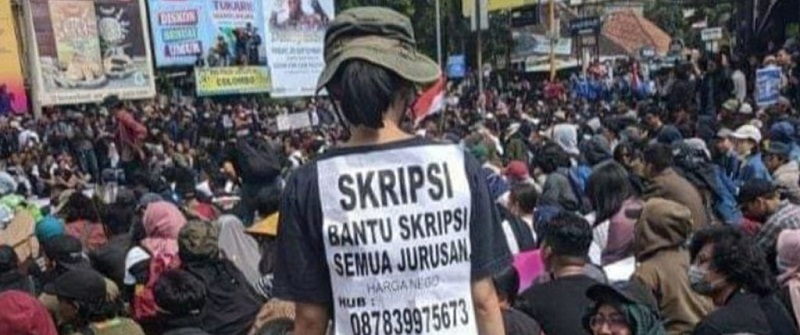
30 Jul Blog: Some Indonesian academic terms the world should know
By Tom Hoogervorst.
There is a long tradition of academic words being derived from Greek and Latin. In fact, some common words – such as neuroscience, metadata, and heteronormative – consist of one Greek and one Latin element. Punctuating one’s publications and presentations with fancy borrowings from French and German is also quite accepted practice.
Not many people would consider using Indonesian for this purpose. But this means missing out on some of the most profound coinages needed by academia right now. For this reason, I humbly present my personal top five.
1) COCOKOLOGI
We’ve all seen them: academic papers with seemingly “prefabricated” conclusions. People who drink beer are more intelligent. Country music makes you suicidal. Dutch was the original language of Paradise. But how do we describe this peculiar act of conclusion-fixing by cherry-picking data? Indonesian has a word for it: cocokologi (cocok = fitting, cocok-cocokan = to make it work). In fact, there’s even a second option: ilmu gathuk. A possible English translation would be “matchology”. Some academics are quite accomplished matchologists indeed.
2) NARASUMBER
I like this one because it literally translates as “resource person”. Using narasumber means sidestepping the elitist dichotomy between “scholar” and “informant”, as the word can denote both. As such, it offers a refreshing take on expertise, which can of course be found far beyond the ivory tower of academia. While the word narasumber has been in use since the 1980s, it has now reincarnated to become narazoomber in response to the global shift to teleconferencing.
3) TUKANG SKRIPSI
There must be dozens of local terms for this global phenomenon: hiring somebody to write your thesis. Surely this is how rich kids around the world obtain their university degrees? Another way of saying the same thing is joki skripsi or joki tesis (joki = jockey). And that’s not the only thing a jockey can do for you; a joki ujian is someone who can take an exam in your place. That certainly would have spared me a lot of headaches back in the day…
4) SCOPUSISASI
Most academics hate it with a passion: the pressure from bureaucrats to publish in top-ranked journals. Scopus, Elsevier’s abstract and citation database, has become the gold standard for Indonesian universities. For a lucky few, publishing in a Scopus-indexed journal creates a pathway towards a professorship. For many others, the “Scopusization” of academia is a financial disaster, as many journals charge hefty publication fees.
5) ARJUNA
You may know Arjuna as the hero of wayang puppetry, but it’s also an acronym for Indonesia’s journal accreditation body (Akreditasi Jurnal Nasional). Arjuna 2.0 was created to assess a journal’s suitability for national accreditation, a requirement for indexation in an international database. Which other heroes of ancient mythology have lent their services, or at least their names, to academic progress? Garuda is now in charge of the Digital Reference Portal (Garba Rujukan Digital), Anjani of the Indonesian Platform for Academic Integrity (Anjungan Integritas Akademik Indonesia), Rama of the Repository for Students’ Final Projects (Repositori Tugas Akhir Mahasiswa), and Sinta of the Science and Technology Index.
One can only hope that the European Research Council will soon introduce similarly awesome coinages to safeguard our hard fought publications across the pond.
Photo: Facebook/Tagar/Ridwan Anshori.
Tom Hoogervorst is a researcher at KITLV, interested in the histories and languages (Malay, Javanese, and all sorts of youth languages) of Indonesia. At the moment Tom is finalizing a research project funded by the Netherlands Organisation for Scientific Research on the language history of Malay, specifically the variety used in Chinese-Indonesian circles.




was050864
Posted at 11:49h, 03 AugustI think tukang skripsi is not exactly academics term.
Bambang Soemarwoto
Posted at 13:08h, 17 OctoberApakah ada padanan kata valorisasi, hilirisasi, dsb? Oh, I am sorry… is there any similar term for valorization, downstreaming, etc.? What is your opinion about applying the notion of TRL (Technology Readiness Level) to research in humanities? Has it been applied at all? I was invited to a session by BRIN to explain about TRL in technology sector… apparently there will be TRL requirements for research proposals in humanities. I wonder what terms will emerge for TRL-1 to TRL-9 maybe you can start thinking about it :))